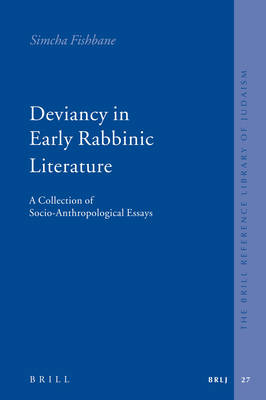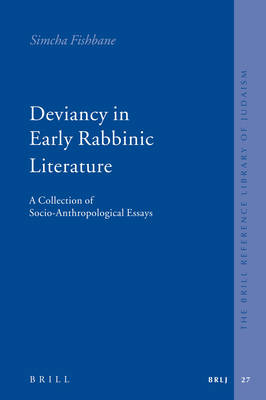
- Afhalen na 1 uur in een winkel met voorraad
- Gratis thuislevering in België vanaf € 30
- Ruim aanbod met 7 miljoen producten
- Afhalen na 1 uur in een winkel met voorraad
- Gratis thuislevering in België vanaf € 30
- Ruim aanbod met 7 miljoen producten
Zoeken
€ 184,95
+ 369 punten
Omschrijving
Deviancy in Early Rabbinic Literature deals with the status of those groups and individuals who, for various reasons, appear to have no place in mainstream Rabbinic Jewish society, or may be perceived by that society as posing a threat to its norms and to its very existence.
The book examines the thoughts and attitudes of the Rabbis set forth in various sections of the Mishnah, Tosefta and Talmud. Deviant groups studied include witches, prostitutes, Gentiles, bastards, Nazirites, soldiers, Kutites, the disabled and the menstruous woman. Social anthropological methodologies are used to provide a unique perspective on the implicit message of the redactors of these Rabbinic texts, and to make these important texts equally accessible to both scholars and laymen interested in acquiring a deeper understanding of these important issues.
The book examines the thoughts and attitudes of the Rabbis set forth in various sections of the Mishnah, Tosefta and Talmud. Deviant groups studied include witches, prostitutes, Gentiles, bastards, Nazirites, soldiers, Kutites, the disabled and the menstruous woman. Social anthropological methodologies are used to provide a unique perspective on the implicit message of the redactors of these Rabbinic texts, and to make these important texts equally accessible to both scholars and laymen interested in acquiring a deeper understanding of these important issues.
Specificaties
Betrokkenen
- Auteur(s):
- Uitgeverij:
Inhoud
- Aantal bladzijden:
- 234
- Taal:
- Engels
- Reeks:
- Reeksnummer:
- nr. 27
Eigenschappen
- Productcode (EAN):
- 9789004158337
- Verschijningsdatum:
- 28/05/2007
- Uitvoering:
- Hardcover
- Formaat:
- Genaaid
- Afmetingen:
- 165 mm x 246 mm
- Gewicht:
- 589 g

Alleen bij Standaard Boekhandel
+ 369 punten op je klantenkaart van Standaard Boekhandel
Beoordelingen
We publiceren alleen reviews die voldoen aan de voorwaarden voor reviews. Bekijk onze voorwaarden voor reviews.








